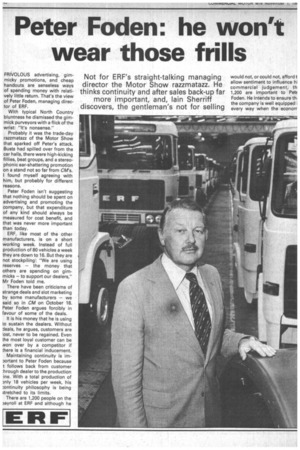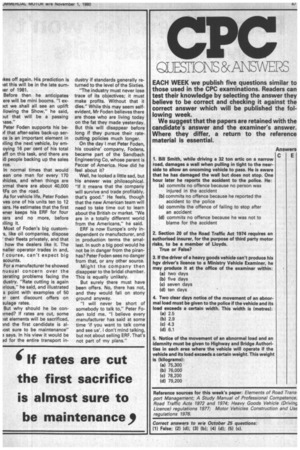Peter Foden: he won't wear those frills
Page 52

Page 53

If you've noticed an error in this article please click here to report it so we can fix it.
FRIVOLOUS advertising, gimmicky promotions, and cheap handouts are senseless ways of spending money with relatively little return. That's the view of Peter Foden, managing director of ERF.
With typical North Country bluntness he dismissed the gimmick purveyors with a flick of the wrist: "It's nonsense."
Probably it was the trade-day razzmatazz of the Motor Show that sparked off Peter's attack. Busts had spilled over from the car halls, there were high-kicking fillies, beat groups, and a stereophonic ear-shattering promotion on a stand not so far from CM's. I found myself agreeing with him, but probably for different reasons.
Peter Foden isn't suggesting that nothing should be spent on advertising and promoting the company, but that expenditure of any kind should always be measured for cost benefit, and that was never more important than today.
ERF, like most of the other manufacturers, is on a short working week. Instead of full production of 80 vehicles a week they are down to 16. But they are not stockpiling: "We are using reserves — the money that others are spending on gimmicks — to support our dealers," Mr Foden told me.
There have been criticisms of strange deals and slot marketing by some manufacturers — we said so in CM on October 18. Peter Foden argues forcibly in favour of some of the deals.
It is his money that he is using to sustain the dealers. Without deals, he argues, customers are lost, never to be regained. Even :he most loyal customer can be Non over by a competitor if :here is a financial inducement.
Maintaining continuity is im3ortant to Peter Foden because t follows back from customer :hrough dealer to the.production me. With a total production of anly 18 vehicles per week, his .:ontinuity philosophy is being Aretched to its limits.
There are 1,200 people on the myroll at ERF and although he would not, or could not, afford t allow sentiment to influence hi commercial judgement, th 1,200 are important to Pet€ Foden. He intends to ensure th. the company is well equipped i every way when the econon ikes off again. His prediction is let this will be in the late sumler of 1981.
Before then he anticipates ere will be mini booms. "I exact we shall all see an uplift lir:awing the Show," he said, )ut that will be a passing lase."
Peter Foden supports his beaf that after-sales back-up serce is an important element in lling the next vehicle, by emoying 16 per cent of his total aff on this task, and there are i0 people backing up the sales rce.
In normal times that would ean one man for every 170 ahicles, and when things are )rmal there are about 40,000 Fs on the road.
As for vehicle life, Peter Foden yes one of his units ten to 12 pars. He estimates that the first vner keeps his ERF for four aars and no more, before illing it.
Most of Foden's big customs, like oil companies, dispose their fleets privately, and that how the dealers like it. The nailer operator trades in and, I course, can't expect big scounts.
For a manufacturer he showed nusual concern over the Derating problems facing the dustry. "Rate cutting is again arious," he said, and illustrated s point with examples of 50 ar cent discount offers on aulage rates.
But why should he be conaimed? If rates are cut, some )st elements will be sacrificed, and the first candidate is allost sure to be maintenance" a says. In his view it would be od for the entire transport in dustry if standards generally returned to the level of the Sixties.
"The industry must never lose trace of its objectives; it must make profits. Without that it dies." While this may seem selfevident, Mr Foden believes there are those who are living today on the fat they made yesterday. But this will disappear before long if they pursue their ratecutting policies much longer.
On the day I met Peter Foden, his cousins' company, Fodens, became part of the Sandbach Engineering Go, whose parent is Paccar of America. How did he feel about it?
Well, he looked a little sad, but his answer was philosophical. "If it means that the company will survive and trade profitably, that's good." He feels, though that the new American team will need to take time out to learn about the British cv market. "We are in a totally different world from the Americans," he said.
ERF is now Europe's only independent cv manufacturer, and in production terms the smallest. In such a big pool would he not be in danger from the piranhas? Peter Foden sees no danger from that, or any other source.
Might the company then disappear to the bridal chamber. This is equally unlikely.
But surely there must have been offers. No, there has not, and they would fall on stony ground anyway.
"I will never be short of somebody to talk to," Peter Foden told me. "I believe every manufacturer has said at some time 'if you want to talk come and see us', I don't mind talking, but not about selling ERF. That's not part of my plans."




























































































